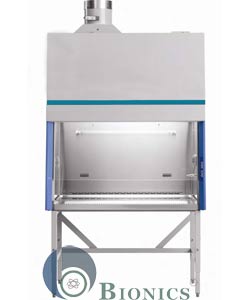Essential Things You Must Know on Class 2 Biosafety Cabinets
Essential Things You Must Know on Class 2 Biosafety Cabinets
Blog Article
Class 2 Biosafety Cabinets: Essential Equipment for Laboratory Safety and Microbiological Containment

Maintaining a safe lab environment is crucial in today’s advanced research and clinical setups. Whether it's conducting biological tests, diagnostics, or experiments with infectious agents, biosafety cabinets are central to preventing cross-contamination and safeguarding personnel.
Among the available options, Class 2 Biosafety Cabinets stand out for their balanced protection. These units are crucial for working with moderate-risk organisms and sensitive samples.
Overview of Biosafety Cabinets in Laboratory Environments
Biosafety cabinets are airflow-controlled workspaces engineered for microbiological safety. They use advanced filters to trap harmful particles before air re-enters the lab.
These units are generally classified into three main types: Class I, II, and III based on containment level. Among these, Class II units strike a balance between user, product, and environmental protection.
Why Class II Cabinets Are the Preferred Choice in Labs
Class 2 Biosafety Cabinets offer simultaneous protection for people, processes, and surroundings. They utilise downward laminar airflow within a sealed system.
Air is treated using dual filtration systems to ensure safe circulation and exhaust. These cabinets are ideal for work involving moderate-risk pathogens (BSL-2/3).
Essential Features of Class 2 Safety Cabinets
A Class 2 microbiological safety cabinet includes several critical technologies such as:
• High-efficiency air filters to ensure clean workspace air
• Uniform downward airflow to protect the sample zone
• Inward airflow to keep aerosols contained
• Germicidal UV lamps to disinfect the work area
• Quiet operation and ergonomic design for user comfort
• Front glass for full control and protection
These elements support lab workers in maintaining sterile working environments.
Where Class 2 Cabinets Are Used
Class 2 Biosafety Cabinets are commonly used across microbiology, biotechnology, diagnostics, and pharma. They are ideal for safe handling of samples during testing and experimentation.
From universities to private pathology labs, Class 2 cabinets ensure lab hygiene and sample integrity.
Benefits of Using Class 2 Biosafety Cabinets
Using Class 2 cabinets offers multiple advantages including operator protection and experimental reliability:
• Protects the integrity of lab work
• Shields operators from harmful aerosols and pathogens
• Minimises lab contamination and pollution risks
These cabinets combine safety features with operational efficiency.
Cabinet Types and Global Compliance
Top manufacturers design units compliant with major biosafety regulations worldwide. Class 2 units are sub-classified as microbiological safety cabinet A1, A2, B1, and B2—based on varying airflow balance and ducting needs.
• Type A2: Ideal for general-purpose labs
• Type B2: Used for hazardous vapors and chemicals
Selecting the right configuration ensures compliance and safety.
How to Select a Class 2 Safety Cabinet
Before purchasing, consider:
• Your application type (e.g., diagnostics, pharma, research)
• Cabinet dimensions, ducting needs, and room layout
• Energy consumption and maintenance frequency
• Warranty, training, and certification services
Partnering with a trusted provider helps meet both performance and safety needs.
Best Practices for Using Class II Biosafety Cabinets
For optimal results:
• Install the cabinet in a draft-free, low-traffic zone
• Get periodic validation from certified technicians
• Ensure operators follow best practices
Operational best practices include:
• Maintain biosafety gear protocols
• Avoid sudden or quick arm movements
• Decontaminate surfaces before and after use
• Never activate UV when humans are present
Final Thoughts on Class 2 Biosafety Cabinets
Class 2 biosafety cabinets are vital equipment in laboratories dealing with biohazards. They ensure contamination-free experiments and personnel safety.
From clinical research to vaccine development, Class II cabinets maintain sterility in sensitive procedures. When investing in a biosafety cabinet, choose performance and reliability over cost-cutting—because lab safety is non-negotiable. Report this page